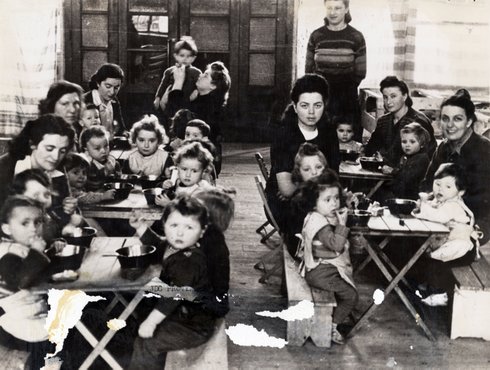Bare Necessities
The U.S. Army and UNRRA provided a bare minimum of rations and clothing; JDC made up the difference. The first goal in aiding Jewish displaced persons was to ensure their survival. Malnutrition was a common condition, and timing was critical. As JDC resolved the difficulties of raising sufficient funds, assessing the needs of a shifting population, and procuring supplies in post-war Europe, it provided as steady and comprehensive an array of services as could be mustered.
Something to wear
The first shipments sent by JDC consisted of clothing. In 1947, it shipped approximately 79,000,000 pounds of shoes and clothing from the U.S. alone.


on the move
Purchasing and transporting food were a major challenge in post-war Europe. JDC gradually worked out a system of its own. Food purchased in France or Switzerland was shipped to Germany or Austria, and then moved by truck to a network of central warehouses for further distribution to the camps. All this had to be done with limited communications.


Enough to eat
Camp residents could count on a regular supply of food, but UNRRA provisions didn’t provide enough calories to restore good health and were largely starch-based. JDC contributed much-needed protein and fats, and where possible, fresh vegetables. Perhaps JDC’s greatest contribution in this area was its supplementary rations for infants and children.



New hope and new Responsibilities
By early 1947, there were 21,000 children among families and 6,000 unaccompanied children in the U.S. Zone, Germany. When the flood of refugees from Eastern Europe reached the camps in Germany, another 13,878 children arrived.

filling a service vacuum
By July 1947, UNRRA disbanded and the newly created International Refugee Organization (IRO) took over, but with severely diminished funds and staff. The U.S. Army had also been pressed to substantially reduce its involvement in the camps. To make up the losses, JDC resolved to provide even more for displaced persons.





